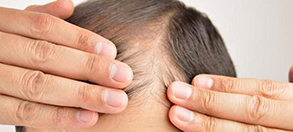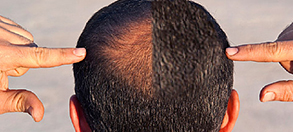Hair loss can be the result of one or several causes. As specialists in men’s and women’s surgical and non-surgical hair restoration including FUE hair transplants, we often get asked questions about hair loss and its causes.
The most commonly asked questions are below. These answers should help you gain a better understanding of the many reasons for hair loss and how Dr. Jezic and his dedicated staff can help their patients regain their lost hair.
What causes your hair to fall out?
Many reasons could be linked to your hair falling out. Not everyone will have one reason as hair loss can be a more complex issue. It is important to assess your medications and see your doctor before pursuing hair restoration to determine if a health condition lays behind your hair loss.
Causes of hair loss can include:
Illness
Diseases or the treatment of a disease may cause hair loss. Some diseases cause hair loss while the methods, such as medications or chemotherapy, used to help attack the disease can cause hair loss as well. You should be informed if a treatment will cause hair loss.
Anxiety
People with a lot of stress in their lives may see a decrease in the thickness of their hair. Hair loss may occur all over the body and should grow back if stress levels decline.
Infection
Fungal infections often cause hair loss. Some people have fungal infections on their scalp that cause their hair to thin or fall out.
Patterned Baldness
Male pattern baldness and female pattern baldness are both very common conditions that affect individuals from all varieties of life. Patterned baldness is often caused by a change in hormones and can be treated with one of the many hair regrowth solutions we offer.
Auto-Immune Disorders
Scalp disorders such as lichen planus and lichen planopilaris, as well as other skin conditions such as melanoma, alopecia areata and other auto-immune disorders can also cause temporary, long-term or permanent hair loss.
Other Reasons
Women can experience hair loss due to a variety of factors including, but not limited to, pregnancy, menopause, post-menopause, postpartum depression, hormonal imbalance, and other factors. Among men and women both, hair loss could be caused by external factors such as accidents, injuries, and other extraneous conditions.
What are the causes of female hair loss?
Whether you are male or female, it can be truly upsetting to see a loss in hair. Although hair loss is more common in men, it is not uncommon for women to experience hair thinning. As a woman, there may be certain reasons why your hair is thinning. Once you understand why your hair is thinning, you can better determine the best way to treat female hair loss.
Causes of hair loss can include:
Genetics
One of the main reasons women’s hair falls out is actually due to genetically-related, female pattern hair loss. This is different from male pattern baldness. In female pattern hair loss, thinning often occurs at the top of the head. One indicator is if more scalp is visible when the hair is put in a ponytail.
Thyroid Conditions
The thyroid assists in many aspects of the body including your metabolism and hormone balance. Thyroid conditions are often associated with hair loss.
Stress
People who experience severe stress or anxiety disorders often experience many physical hardships that include weight fluctuations or hair loss. Medication and therapy can help get anxiety under control and, as a side-effect, restore hair that was lost.
Medications
There are quite a few medications that can impact your hair and contribute to its loss. These medications may include steroids, birth control pills, antidepressants, retinoids, and many more. This doesn’t mean that you should stop taking a medication that likely causes your hair loss. Instead, it is possible to find a formula of the medication that still provides the benefits you need while not negatively affecting your hair.
Hormone Disorders
Hormone disorders often affect men and women as they age. Fluctuations in hormones can cause hair loss, hair thinning or inconsistent hair growth.
Anemia
Specifically, iron-deficient anemia is most commonly found in women and can contribute to thinning hair follicles. An iron supplement should help you manage the deficiency and restore lost hair.
Alopecia Areata
An autoimmune disorder, Alopecia Areata is a disease in which the body targets hair follicles. This disease causes hair loss and can be managed with treatment.
Pregnancy and Menopause
These can also cause hair loss, during and after pregnancy as well as menopause including pre and post-menopause.
If you are experiencing hair loss, it is an important step to see your doctor and make sure there are no underlying illnesses.
What medical conditions cause hair loss?
Sometimes an illness or medication can be the cause behind hair loss. Medical conditions that can cause hair loss include:
- Pregnancy
- Thyroid disorders
- Anemia
- Autoimmune diseases such as Alopecia Areata, lichen planus, lichen planopilaris, lupus and others.
- Skin conditions (such as psoriasis)
It’s always a good idea to go to your regular doctor before pursuing hair loss treatment just in case there’s an underlying medical condition. Getting treatment for the condition may help you regain some of your lost hair, and if not then you can always schedule a consultation with us to create a treatment plan.
How can I stop my hair loss?
The best way to stop your hair loss begins with properly diagnosing the cause or causes of your condition. Hair loss can be caused by one or several factors including heredity, changes in hormones, the development of medical conditions, radiation therapy, stress, and medications.
Different causes of hair loss need to be addressed with different treatments. It is important to determine the specific cause of your hair loss so we can better develop your treatment plan.
Dr. Jezic will take the time to learn more about your medical history and current health. The first step in every treatment plan it to preserve existing hair and stop the hair loss. This information along with an examination will help Dr. Jezic create your best treatment plan.
How can I stop worrying about hair loss?
The best way to stop worrying about hair loss is to be proactive.
Hair loss is often stressful for men and women and it is quite normal to worry about losing your hair. Coming up with a plan can give you an early advantage in preventing premature hair loss. We offer many techniques to help men and women regain their heads of hair, but many treatments work best when implemented at the earliest signs of hair loss. These treatments will be customized to your aesthetic goals and health to ensure positive results.
We want you to be confident and look your best, which is why we offer a range of hair restoration treatment. Give us a call today to get started down the path to fuller and thicker hair.
How can I stop hair loss and regrow hair naturally?
Hair loss can be due to many different issues. The way you stop your hair loss progression will relate to the cause behind your hair loss. Dr. Jezic will help you determine why you are losing hair and put together a treatment plan that takes your health and desired results into consideration. Hair loss treatments can include medications, PRP application or a FUE hair transplant procedure where hair follicles are relocated to the thinning areas. These treatments work to naturally restore your hair.
What foods cause hair loss?
Your diet has a lot to do with the quality of not only your hair but also your nails, skin and whole body. A poor diet made up of fast foods, snacks and fatty and sugary treats can have a negative effect on your overall health, which includes the health of your hair. Changing your diet and adopting a healthier lifestyle can help you keep your hair looking great.
Certain foods are known to play a bigger role in helping you maintain a healthy, glossy head of hair. These foods often contain essential fatty acids, like omega-3s that are found in salmon, nuts, and seeds.
Certain vitamins will improve the health of your hair such as Biotin, B6 and B12 that are found in bananas, spinach, and potatoes. Eating plenty of fresh fruit, vegetables, and whole grains will also play an important role in keeping your hair luscious. A healthy diet and active lifestyle can help you maximize the results achieved with Dr. Jezic.
What treats female hair thinning?
Medications such as oral or topical corticosteriods, follicular unit extraction (FUE), FUT hair transplants, or PRP treatment are all capable of helping restore hair health. Dr. Jezic will take the time to get to know you, your health and end goal to create your best treatment plan specific to your needs.
After a treatment, once your hair is on its way to becoming thicker and fuller, make sure to maintain healthy diet and exercise habits.
An active, balanced lifestyle will further improve the quality of your hair. Eating plenty of fruits, veggies, and foods with healthy oils will not only help your hair look shiny it will improve your overall health.
How can I regain my lost hair?
Restoring hair in balding or thinning areas can be achieved with FUT and FUE hair treatments as well as PRP injections and procedures. Encouraging new growth in areas of the scalp that are balding or thinning may require other types of hair treatment. Dr. Jezic offers his patients a wide array of hair restoration options so that people with various hair loss concerns can find their perfect solution.
The over-the-counter (OTC) and prescription-drug based solutions are generally designed to preserve existing hair rather than restore hair. These options include:
Finasteride
Finasteride is the generic name for the popular hair medication Propecia and it is orally taken. When taken, this medication can help preserve male and female hair but is not a treatment for male pattern baldness or female pattern baldness. Female Propecia for women’s hair loss is also available. The treatment has been able to help many patients stem their hair loss. However, it does not eliminate the need for hair transplants since it does not restore lost hair.
Minoxidil
Minoxidil is one of the more popular treatments and is commonly known as Rogaine. This treatment has been available for many years and is FDA-approved to be sold over-the-counter. This treatment is a topical application that can help retain hair. However, since it is unable to regrow hair, most patients eventually opt for FUT or FUE hair transplants.
PRP
PRP, or platelet-rich plasma, is found in the blood and assists in your body’s natural healing process. PRP is rich in proteins that help lower inflammation and lowers healing time. For hair restoration, PRP will be injected into the areas of the scalp to reinvigorate hair health or improve hair growth. This treatment can be used alongside follicle relocation to provide great results!
Neograft Follicular Unit Extraction (FUE)
This no-touch hair transplant procedure is completed with cutting-edge technology and highly-advanced motorized devices. Traditional hair transplant techniques often leave a large linear scar on the back of the head whereas the Neograft FUE procedure will only require you to shave the back of your head and not put you at risk of linear scarring. Neograft FUE treatments are growing in popularity and helping men and women regain a healthy, full head of hair.
These treatments including hair restoration and hair transplant procedures are designed to treat the various concerns people are faced with. Whether you are a woman noticing your hair thinning or a man bothered by male pattern baldness – we have a solution for you. Reach out to us today to begin your hair restoration treatment.
Dr. Jezic is dedicated to helping you find a healthy, safe way for you to regain your hair. If you are interested in learning more about the hair restoration and the many solutions we offer, schedule a consultation with us today by clicking here or calling our office at (713) 864-2300.


